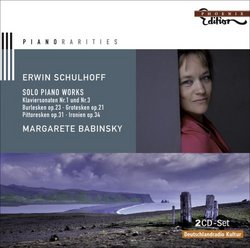| All Artists: Erwin Schulhoff, Margarete Babinsky, Maria Lettberg, Andreas Wykydal Title: Erwin Schulhoff: Solo Piano Works Members Wishing: 0 Total Copies: 0 Label: Phoenix Edition Original Release Date: 1/1/2009 Re-Release Date: 4/28/2009 Genre: Classical Styles: Chamber Music, Historical Periods, Classical (c.1770-1830), Modern, 20th, & 21st Century Number of Discs: 2 SwapaCD Credits: 2 UPC: 811691011813 |
Search - Erwin Schulhoff, Margarete Babinsky, Maria Lettberg :: Erwin Schulhoff: Solo Piano Works
 | Erwin Schulhoff, Margarete Babinsky, Maria Lettberg Erwin Schulhoff: Solo Piano Works Genre: Classical |
Larger Image |
CD Details |
CD ReviewsTwo CDs of Delightful Piano Music by Schulhoff J Scott Morrison | Middlebury VT, USA | 06/09/2009 (5 out of 5 stars) "Erwin Schulhoff (1894-1942) is one of the central European composers whose life was cut short by the Nazis. He died in the Wülzberg concentration camp in August, 1942. One can only speculate what his career, and musical output, might have been had he survived. He had studied with the likes of Debussy and Reger, had absorbed influences as disparate as jazz and the twelve-tone school. His music is always tonal (or polytonal) but has a few passages of extreme dissonance. His rhythmic sense is highly developed; one frequently hears modern dance rhythms. One can also hear 1920s and 1930s jazz harmonies. Much of his music is sardonic or insouciant, as if he were a combination of Shostakovich and Poulenc (or even Satie). One also hears a sensibility similar to Prokofiev in some of his piano works, like the Sarcasms. Occasionally one is reminded of Zez Confrey's Kitten on the Keys.
Since Amazon does not list the titles of the pieces on this 2 CD set as of the date of this review, I shall do so: Piano Sonata No. 1 Piano Sonata No. 3 Five Grotesques Five Burlesques Five Picturesques Six Ironies, and Eight Jazz Improvisations Six Ironies and Six Jazz Improvisations are for two pianos. Margarete Babinsky, a pianist not previously known to me, is a marvelous player and she is heard in all the selections. She is joined by Maria Lettberg for Six Ironies, and by Andreas Wykydal for the Jazz Impovisations. The two sonatas, while partaking of easily heard classical sonata-form procedures, are light-hearted and rhythmically alive. The third of the five Picturesques is named 'In Futurum'. Its score (reproduced in the CD's booklet) consists only of a full-page of precisely notated rests; it dates from 1919, 30+ years before John Cage's more famous silent piece, 4'33". 'In Futurum' is surrounded by four pieces inspired by then-current dances: Foxtrot, Ragtime, One-Step, and Maxixe. They are all delightful (although Foxtrot sounds more like a Ragtime to me). The Jazz Improvisations are unusual in that they arose from radio performances that Schulhoff did with a second pianist, Karel Boleslav Kirák. Schulhoff notated his part and Kirák improvised jazz licks on top of that. Kirák's contributions were never notated or recorded. In this recording pianist Andreas Wykydal improvises his own jazz comments as Babinsky plays Schulhoff's extant notated score. The eight pieces sound very much like jazz of their time, the early 1930s. And they are delightful. Those of you who already know and love Schulhoff's orchestral and chamber pieces will want to snap this one up. Kathryn Stott has also recorded some of Schulhoff's piano music but the only overlap of repertoire is the First Sonata. Schulhoff: Piano Music "Hot Music" Scott Morrison" |
